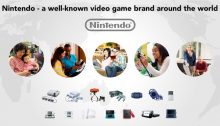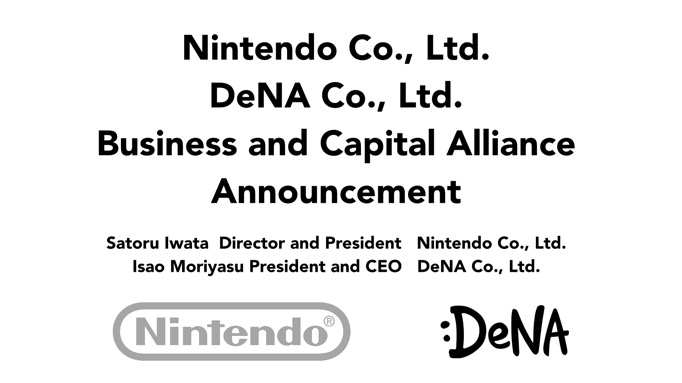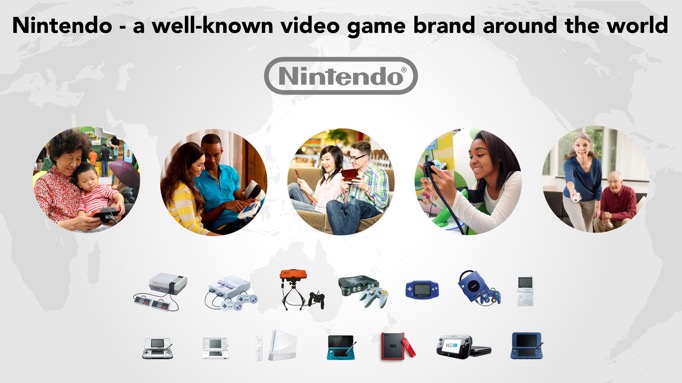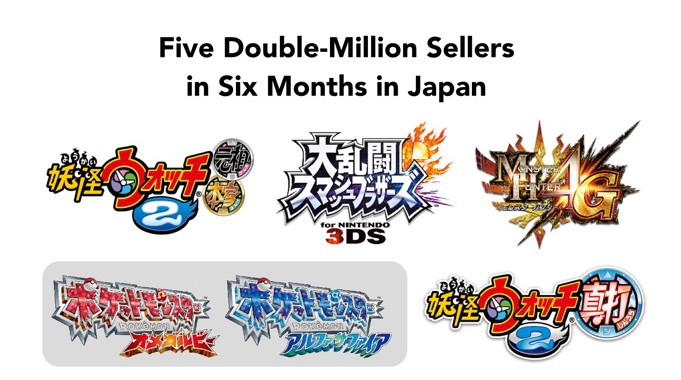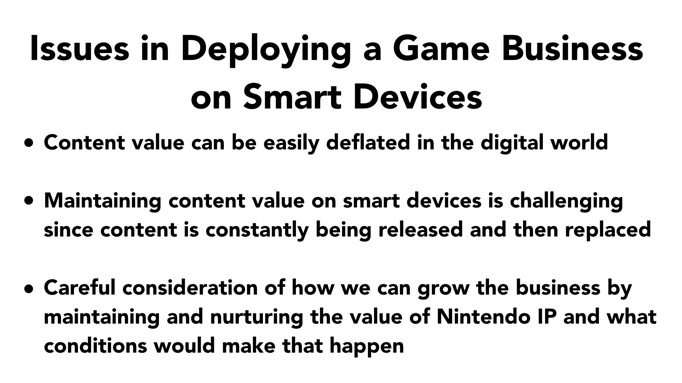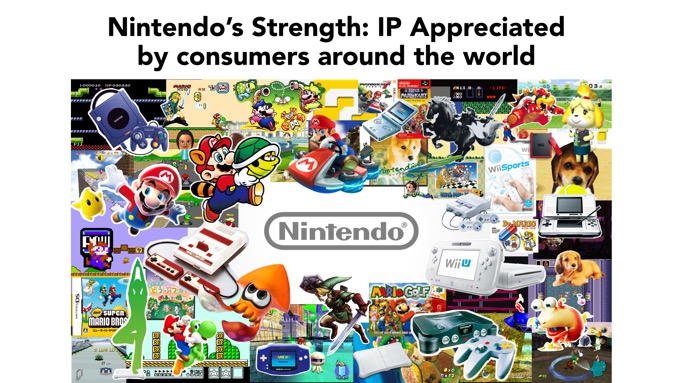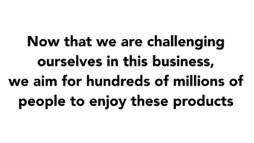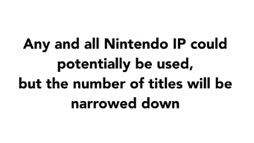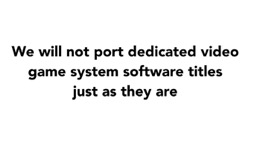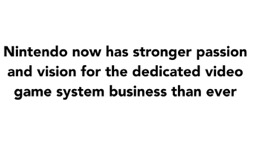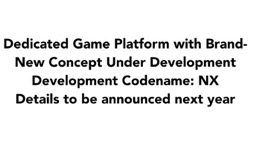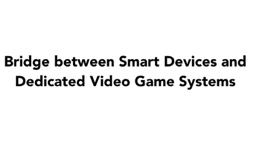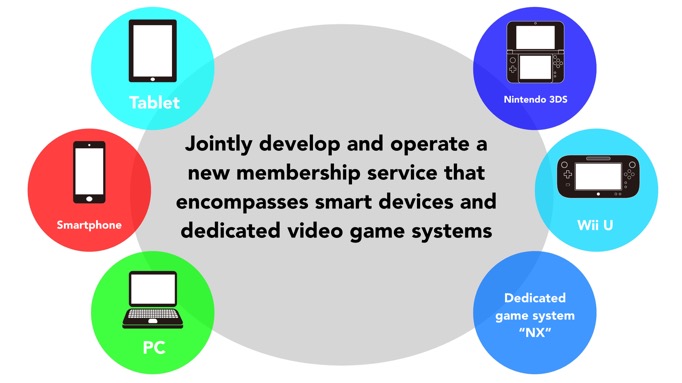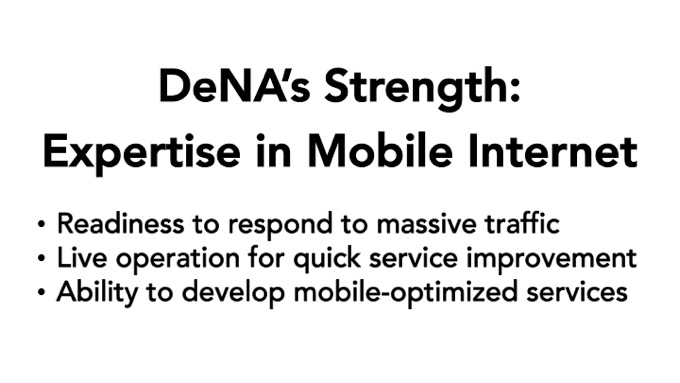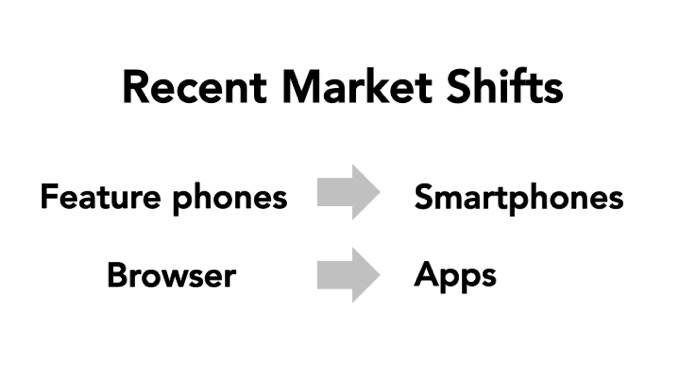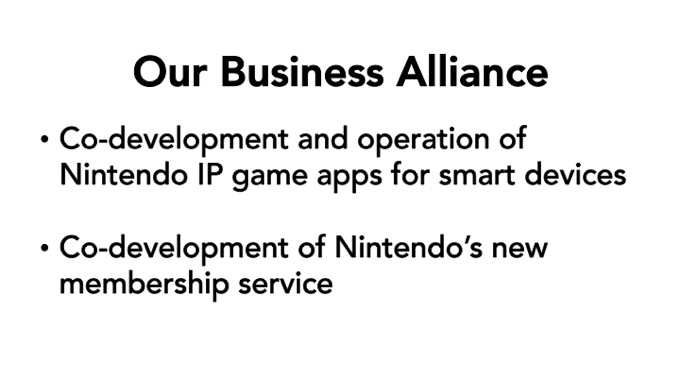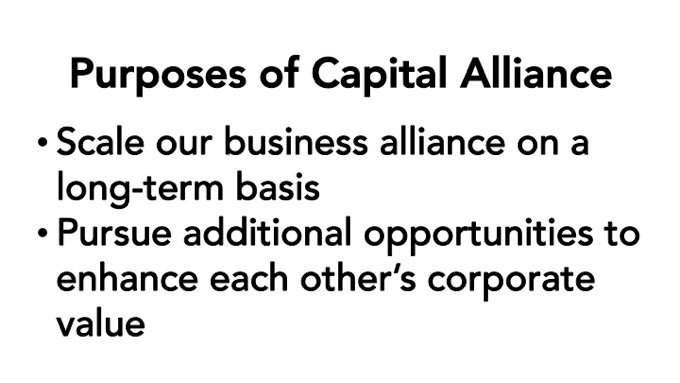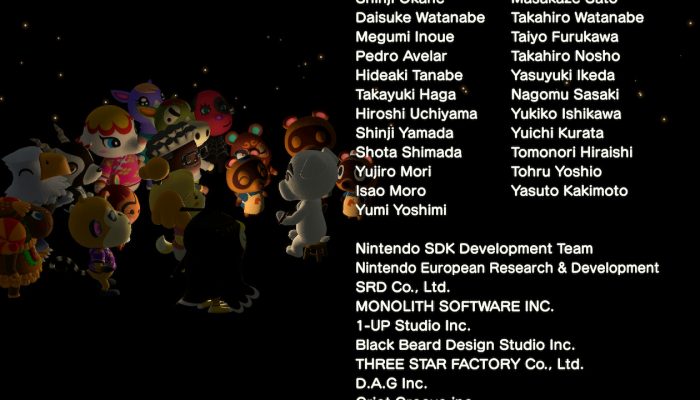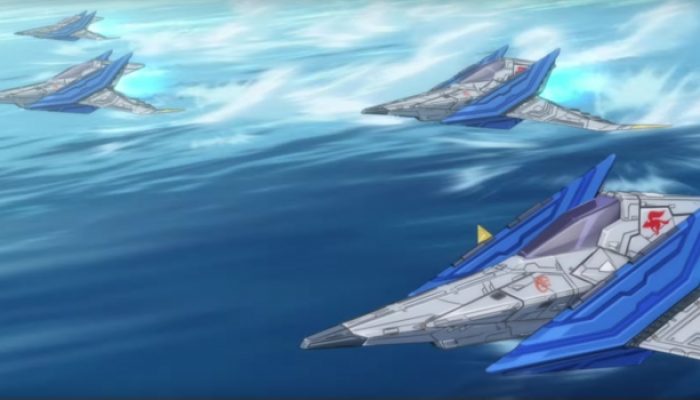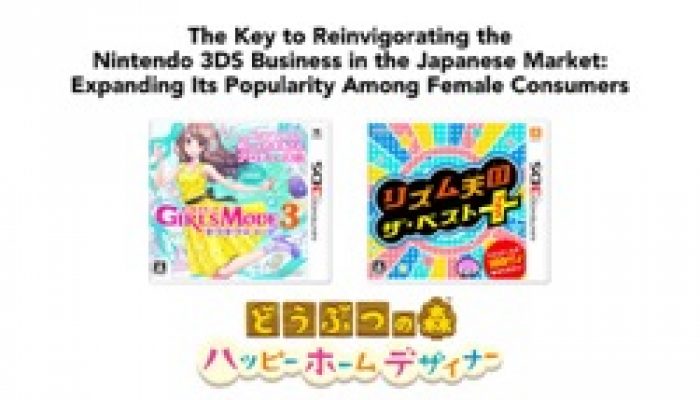 Here’s the official English script of this week’s biggest announcement in its entirety.
Here’s the official English script of this week’s biggest announcement in its entirety.
☆ NintendObs Event – Nintendo and DeNA.
Satoru Iwata (Director and President Nintendo Co., Ltd.):
Thank you for attending this briefing at such short notice.
I am Satoru Iwata, president of Nintendo. Together with Mr. Isao Moriyasu, president of DeNA Co., Ltd., I would like to explain the business and capital alliance of the two companies that each company announced earlier today.
Iwata:
I met Mr. Moriyasu for the first time in June 2010.
Mr. Moriyasu first approached us with a proposal to use Nintendo IP in their mobile games. He was very passionate about the prospect of collaborating with Nintendo in some way, so we have continued our talks since then.
At some point in the past, I realized that there would be great potential for global synergy by combining the efforts of the two companies, as we would face dynamic environmental changes. Since then, in addition to my discussions with Mr. Moriyasu, key persons from both companies have been discussing these possibilities.
As a result, we have concluded that we will be able to create great synergies by forming a business alliance and leveraging the two companies’ strengths.
Iwata:
I think that for most of you here today, our alliance may have been unexpected. So, I would first like to explain the background and our objectives for this business alliance with DeNA.
Iwata:
As you know, Nintendo has been globally deploying its hardware-software integrated platform business since the debut of Nintendo Entertainment System (known as “Family Computer System” in Japan) in 1983 and, fortunately, Nintendo has become a well-known video brand name throughout the world.
Iwata:
On the other hand, in recent years, with the spread of smart devices, we have increasingly heard a variety of opinions on the future of the dedicated video game system business, and in particular relatively pessimistic ones.
We lost the balance of revenue and expenses as the era of the super strong yen occurred during the transition periods from Nintendo DS to Nintendo 3DS and from Wii to Wii U, and we were not able to make these platform transitions as smoothly as we had expected. I understand that this situation has motivated people to suggest that dedicated video game systems too may be consumed by smart devices since the latter has already been said to have consumed a variety of dedicated devices such as digital music players, digital cameras and car navigation systems.
Iwata:
However, there is an obvious difference between Nintendo’s dedicated video game systems and other dedicated devices, which are said to have been displaced by smart devices: Nintendo is the biggest game software provider for its dedicated video game hardware. Even though “who is providing applicable content” must be a very important factor, the pessimistic view on dedicated game systems neglects to acknowledge this difference.
Iwata:
Last year, an unprecedented thing in the history of the Japanese video game market happened: Five titles for Nintendo 3DS sold more than two million copies each in the latter six-month period of 2014. As this record-breaking incident attests, video game software sales have been progressing smoothly on dedicated video game hardware even after smart devices have become widespread in this country.
Iwata:
Of course, the challenge of asking our consumers to purchase dedicated video game hardware has become harder now that smart devices have widely spread. However, we recognize that our business model of producing both video game hardware and software is effective even today, and we do not share this pessimistic view of the future for dedicated video game systems.
Iwata:
When we further analyze the situation, Nintendo’s strength lies in, or our consumers see the most value in and are willing to pay money for, Nintendo IP, such as our software and characters, and we have been creating and nurturing them together with the history of home video game entertainment.
Iwata:
In order to flexibly deal with the developments of the Internet and social media as well as the changes in the people’s lifestyles, we will start strategic endeavors so that Nintendo can maximize the value of our IP that we have used primarily for our own dedicated game platforms.
I announced Nintendo’s management policy of “more actively utilizing Nintendo IP” and “taking advantage of smart devices” in our Corporate Management Policy Briefing back in January 2014. The endeavors that I am explaining now are in line with these management policies.
On the other hand, if we are to maximize the value of Nintendo IP while the competition to attract consumers’ attention is fierce, we must deliver the value of Nintendo IP in a stress-free fashion to our consumers around the world who are living in varying environments.
This is why Nintendo has decided to utilize smart devices aggressively.
Very simply put, it is structurally the same as when Nintendo, which was founded 125 years ago when there were no TVs, started to aggressively take advantage of TV as a communication channel. Now that smart devices have grown to become the window for so many people to personally connect with society, it would be a waste not to use these devices.
Source: Nintendo JP.
Iwata:
Although this is something we intend to discuss more concretely in other opportunities, we are making progress in our efforts to maximize the value of Nintendo IP for our consumers via a variety of different communication methods, including licensing our IP to visual content and a range of other character merchandising products.
Iwata:
For more than 30 years now, Nintendo has been creating various IP for its game software, and as new iterations of the franchises are introduced, the value of each IP is strengthened. Today, there are many fans for each IP, and each one has different consumers with different lifestyles.
Therefore, it is natural that the best way to communicate our IP to each consumer also differs. We choose the most appropriate method to try to maximize the number of people who encounter Nintendo IP and, as a result, we will further expand the gaming population. This is our basic strategy.
Among the variety of different communication media, smart devices show outstanding strength when it comes to global use rate, contact frequency and total contact time even though each contact period is short.
Iwata:
Of course, Nintendo will utilize smart devices as communication media for Nintendo IP. In addition, so that our consumers will be closely connected with them, we will deploy a game business which takes advantage of Nintendo IP.
Iwata:
Quite a few of you must be wondering why Nintendo, which has never deviated from its cautious stance in regard to the possibility of deploying its game business on smart devices, has now changed its policy.
Please note, however, that I was not dismissing the idea of making games for smart devices per se as I stated at the January 2014 Corporate Management Policy Briefing that a development team of Nintendo would create a smart device application, and please also note that I had not ruled out the possibility of making games when we make use of these devices.
Iwata:
On the other hand, I really had to thoroughly consider how we would be able to grow the business by maintaining and nurturing the value of Nintendo IP and what conditions would make that happen, because the value of content can easily be deflated in the digital world and, especially on smart devices, it is not easy to maintain content value since the lifespan tends to be very short as much content is released and then replaced so quickly. We are making these announcements today because we now have Nintendo’s answer to these questions.
Iwata:
Just looking at the fact that several applications that earn great profits are highly visible in the smart device game business, people in general appear to see it as an easy money market. The fact is, however, it is a highly competitive market and only a handful of content providers have been able to show enduring results. If Nintendo cannot make it to that handful of winners, it does not make sense for us to be engaged in the software business on smart devices.
Iwata:
Accordingly, we had been thinking that if we ever decided to do it, we would have to put ourselves in the best position to prosper.
For many years, Nintendo has shown results as a company which produces products that satisfy consumers with their high quality at the time of the purchase. For the content on smart devices, on the other hand, to be appreciated by consumers, they must provide ever-evolving services in addition to being high-quality products.
Iwata:
This collaboration will create the best prospects for both DeNA and Nintendo.
Iwata:
Just as I explained to you today, Nintendo’s unique strength lies in its IP, which is appreciated by consumers on a global scale.
Iwata:
DeNA’s strength is its world-class Internet service construction and operating know-how.
Source: Nintendo JP.
Iwata:
Nintendo and DeNA will jointly develop and operate gaming applications for smart devices in global markets.
With this alliance, new entertainment that utilizes Nintendo’s IP will be provided globally via smart devices.
Iwata:
Needless to say, now that we are challenging ourselves in this new business area, we hope that hundreds of millions of people will use and enjoy these products.
Iwata:
As for which Nintendo IP will be used, we do not intend to make any exceptions. Potentially, any Nintendo IP could be used in our smart device software. On the other hand, as I just said, games on smart devices require ever-evolving services rather than just being a finished product. A combined effort will be necessary to operate them. People’s attention would only be dispersed if we simply increased the number of the titles we simultaneously released, and we could not expect to expand our business. Accordingly, we will narrow down the titles for development and operation to some extent.
Iwata:
Please also note that, even if we use the same IP on our dedicated video game systems and smart devices, we will not port the titles for the former to the latter just as they are. There are significant differences in the controls, strengths and weaknesses between the controllers for dedicated game systems and the touchscreens of smart devices. We have no intention at all to port existing game titles for dedicated game platforms to smart devices because if we cannot provide our consumers with the best possible play experiences, it would just ruin the value of Nintendo’s IP.
And, if I can talk a bit further about our game development plan, we will continue doing our best to develop dedicated game titles for our dedicated game hardware platforms just as we have been doing. For smart devices, even in the case where we utilize the same IP, we will create completely new game software that will perfectly match the play styles of smart devices.
As for the details of the game applications for smart devices, we will make the announcements on other occasions. I hope you will look forward to our future announcements.
Iwata:
While this is not something directly relating to the collaboration that we have announced today, here is one thing I would like to mention to avoid any misunderstandings.
Nintendo has decided to deploy its video game business on smart devices but it is not because we have lost passion or vision for the business of dedicated video game systems. On the contrary, now that we have decided how we will make use of smart devices, we have come to hold an even stronger passion and vision for the dedicated video game system business than ever before. Nintendo has made this decision because we have concluded that the approach of making use of smart devices is a rational way for us to encourage even more people around the world to recognize the great value of the wonderful game software available on our dedicated game systems.
Iwata:
As proof that Nintendo maintains strong enthusiasm for the dedicated game system business, let me confirm that Nintendo is currently developing a dedicated game platform with a brand-new concept under the development codename “NX.” It is too early to elaborate on the details of this project, but we hope to share more information with you next year.
Iwata:
Smart devices have the widest reach and, thus, have the strongest potential for us to be able to connect with the largest number of consumers.
We aim to construct a bridge between smart devices and dedicated video game hardware that connects consumers to our dedicated video game systems.
For the consumers who are connected with Nintendo through smart devices and interested in Nintendo’s IP, we would like to provide even more premium gameplay experiences on Nintendo’s dedicated game platforms. By taking this approach, we firmly believe that doing business on smart devices will not shrink our dedicated video game system business and will instead create new demand as this broader reach will enable us to provide consumers around the world with more opportunities to experience the appeal of Nintendo IP, and instead of trying to seize the other’s demand, dedicated video game systems and smart devices will benefit from the synergies created between them.
Iwata:
Nintendo, together with DeNA, will jointly develop a new membership service which encompasses the existing Nintendo 3DS and Wii U systems, the new hardware system with a brand-new concept, NX, and smart devices and PCs, and Nintendo will be the primary party to operate this new membership service. Unlike the Club Nintendo membership service that Nintendo has been operating, the new membership service will include multiple devices and create a connection between Nintendo and each individual consumer regardless of the device the consumer uses. This membership will form one of the core elements of the new Nintendo platform that I just mentioned.
Iwata:
The two companies have decided to collaborate because, for the challenges we explained today, the strengths of both Nintendo and DeNA will create an extremely powerful combination.
And now, I would like to ask Mr. Moriyasu of DeNA to speak.
Isao Moriyasu (President and CEO DeNA Co., Ltd.):
Hello, I’m Isao Moriyasu, President and CEO of DeNA. Thank you for joining us today despite our sudden invitation.
Please allow me to share background and objectives of our new alliance from DeNA’s perspective.
Ever since DeNA was founded in 1999, we have launched a range of online services. In 2004, we shifted our focus to the mobile arena and accumulated world-class expertise in building and operating mobile services.
Source: Nintendo JP.
Moriyasu:
DeNA’s expertise lies in, for example, the infrastructure technology that can handle massive amount of traffic. We are also able to manage live operation by analyzing user activities and quickly reflecting the insight to improve our service. We have extensive expertise in developing mobile services that are optimized for small screens and short, in-between time usage. I believe this alliance came together because Nintendo recognized these strengths and capabilities of DeNA.
Moriyasu:
Since we launched our mobile game platform in 2006, DeNA has owed much of its growth to mobile gaming, which is currently our core business. In the past couple of years in Japan, we have tried to adapt ourselves to the rapid market shift from feature phones to smartphones as well as browsers to native apps. I admit it took longer than we initially expected.
Moriyasu:
But we created a native app hit last year, and we are certainly gaining strong momentum in the app market.
Moriyasu:
However, the competition in the mobile game app space has been intensifying. All kinds of new titles are launched every day even though the number of mobile games a user can play in a day is quite limited. It’s becoming increasingly difficult to get games noticed. This is happening globally.
Moriyasu:
In order to get consumers to notice a game and actually take time to play it, a compelling differentiator is needed. The most apparent of all differentiators is, I believe, intellectual property, or IP.
Moriyasu:
Nintendo probably has the most beloved game IP globally. At DeNA that’s our understanding, and I’m sure many of you see it the same way.
Moriyasu:
I believe teaming up with Nintendo is the best possible strategy to achieve growth in DeNA’s core business of mobile gaming.
Moriyasu:
As Iwata-san mentioned earlier, it was June 2010 when we first met. We met several times after that, and last summer we began specifically envisioning the idea for our alliance. We had numerous meetings where I myself talked to many Nintendo members in person. The more we talked, the stronger I believed each company’s strengths could complement one other. I started to wonder how huge of an impact we would make globally as one team.
Moriyasu:
Some may think the two companies’ corporate cultures don’t really match, but it’s rather the opposite. We have been able to advance the alliance project with compassion and mutual respect for the other company’s strengths. By forming a joint team consisting of Nintendo and DeNA members, I firmly believe we will be able to create major synergies and deliver compelling products with new value to our customers.
Moriyasu:
Our new business alliance, as Iwata-san discussed earlier, consists of two parts. One is to jointly develop and operate gaming apps that use Nintendo IP, for smart devices. The other is to build together Nintendo’s new online membership service.
Source: Nintendo JP.
Moriyasu:
In addition to the business alliance, we also formed a capital alliance where both companies own part of each other’s stock. Under the alliance, both companies will share each other’s unique know-how, and this allows for a firm, long-term relationship.
Moriyasu:
There are a few other reasons why we also entered into a capital alliance. We want to scale our business alliance on a long-term basis rather than short. Additionally, we plan to pursue other opportunities to enhance both companies’ corporate value without limiting our joint efforts just to the new alliance. So please stay tuned to both companies for more news in the future.
Moriyasu:
Lastly, I want to make a comment as a fan of games. I grew up playing Nintendo games, and I’m already excited that I will soon be able to play Nintendo IP games on smart devices.
At DeNA, we are aware that Nintendo has been the most beloved company in the gaming console space for quite a while. As such, I would like us to be a team that delivers the best games that truly delight our customers.
Thank you.
Iwata:
Generally speaking, an alliance is an approach that aims to realize certain objectives by leveraging the strengths of the other party in areas where each company could not easily succeed by itself. In that sense, there is a large significance in these two companies with different strengths working together, and so that we can review this business alliance in the medium to long term, we decided to make the capital alliance as well.
Lastly, allow me to add some final comments to express my aspirations for this alliance.
Many content providers who are succeeding on smart devices are depending on single hit titles. One of my goals here is, now that we are challenging ourselves with this endeavor by making use of Nintendo IP, to produce multiple hit titles at an early stage after we start releasing our software on smart devices.
Also, until now, when we said, “platform,” it meant a specific video game platform. Now that we are going to release games on smart devices and make use of globally widespread PCs and smart devices for our new membership service, we would like to offer more consumers with software that is suited to their tastes. In other words, we are challenging ourselves to redefine what “Nintendo platforms” mean.
With this collaboration with DeNA, a partner with different strengths, we aim to achieve this goal as soon as possible.
Thank you very much for listening.
– Satoru Iwata, Director and President, Nintendo Co., Ltd.
– Isao Moriyasu, President and CEO, DeNA Co., Ltd.
Source: Nintendo JP.
At NintendObserver, the comments are on Discord.
Click on Community to learn more. 🙂
…
…Wanna play? Buy a Wii U.
And if you’ve already got yours, here are all the games already available on the platform. 😀
